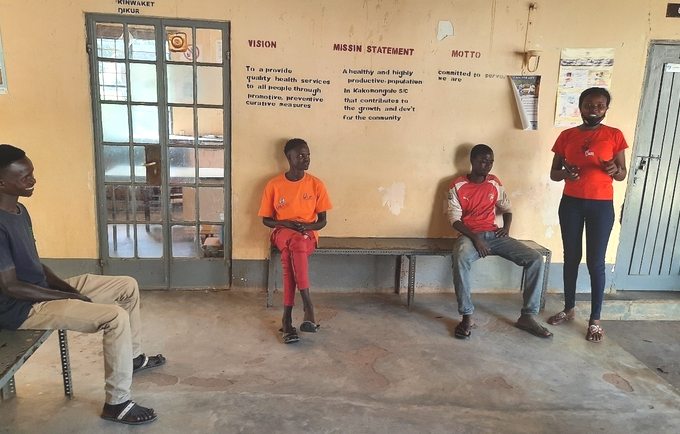NAKAPIRIPIRIT, Uganda—Ngiro Markson, 27, admits he was not an exemplary husband before he joined The Windmill Boys Club: “I was very violent. I would drink excessive [amounts of] alcohol and beat up my wife,” he said.
His outlook has changed considerably since becoming a member of the club in Tokora sub-county in Nakapiripirit district.

“I would stay out with my peers for long hours. I was not fending for my family,” Ngiro said. He reduced his alcohol intake and become a change agent, discouraging violence and promoting peaceful means of resolving conflict. “The club has enlightened and taught me how to be a responsible citizen,” he said.
I was not fending for my family. The club has enlightened and taught me how to be a responsible citizen.
The 25-member Windmill Boys Club is one of the Empowerment and Livelihoods for Adolescents (ELA+) clubs supported by the Karamoja United Nations HIV Prevention Programme (KARUNA). It was launched in March 2019 and implemented through the Bangladesh Rural and Advancement Committee (BRAC), with UNFPA support.
Members take part in social activities and together with other young people in their communities, they discuss sexual and reproductive health, including HIV and gender-based violence (GBV) prevention, and facilitate the distribution of condoms.
Empowering vulnerable teens with skills and confidence
In Uganda, one in every four girls is either pregnant or has had their first child by the age of 19, putting the teenage pregnancy rate at 24 per cent, according to the Uganda Demographic Health Survey (UDHS, 2016). At Least one in ten girls is married before she turns 15. In Karamoja region, the major drivers of teenage pregnancy are poverty and early, forced and child marriages.
Gender-based violence and harmful practices are also widespread in Karamoja, perpetuated by harmful cultural norms such as wife battering, child marriage and female genital mutilation, which increases the risk of HIV infection. Up to 53 per cent of women have experienced physical violence and around 13 per cent have experienced sexual violence in Karamoja since the age of 15 (UDHS, 2016).
The ELA+ programme seeks to improve the quality of life of vulnerable adolescents by creating an organized space where they develop a set of skills to become confident, empowered and self-reliant individuals. In doing so, they contribute to positive change in their own families and communities.
The members participate in social activities, including indoor games, book clubs, storytelling, short dramas, singing and poetry recitals. Importantly, they also learn life skills and financial literacy, and they attend “Fathers forum’’ meetings, which are public discussions led by fathers on issues affecting the community, especially GBV, child marriage and teenage pregnancy. The clubs also hold discussions on social and health-related issues, such as discouraging harmful cultural practices like courtship rape (a cultural practice among the Karomajong people where a man rapes a girl and then proceeds with marriage arrangements) and encouraging dating couples to test for HIV before getting married.
Of the 25 members at Ngiro Markson’s club, five boys have re-enrolled in school and another two now run a youth-friendly centre at Tokora HC IV as volunteers. Two more club members have enrolled as youth champions for Reach-a-Hand Uganda, a youth-centred organisation that empowers young people on behaviour change communication, sexual and reproductive health, and HIV & AIDS awareness and prevention, and livelihood skills.





